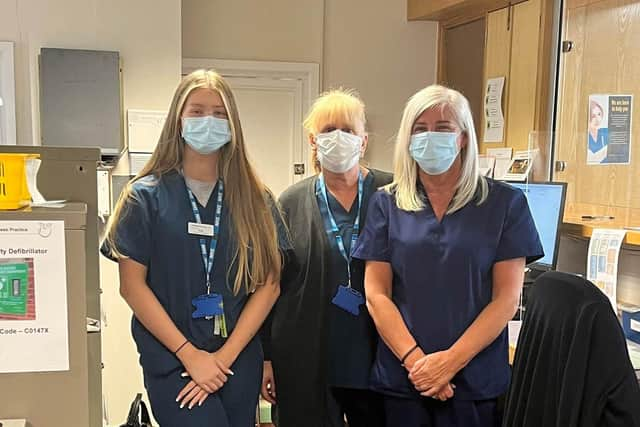Sheffield health: How the role of GP receptionist has changed
and live on Freeview channel 276
The role of GP receptionist has changed in recent years, and doctors say they continue to play a key part in helping patients get the right care, by the right healthcare professional at the right time.
Now known as care navigators or care coordinators, receptionists have a much wider role than just answering phones and making appointments.
Advertisement
Hide AdAdvertisement
Hide AdThere are currently unprecedented pressures across health services in Sheffield which GPs say is in common with most areas of the country and is leading to huge levels of demand for their services.


Sheffield Clinical Commissioning Group says seeing a GP isn’t the best option for the patient. Studies show that 25 to 40 per cent of consultations with a GP are unnecessary.
And health chiefs add that some patients may receive more appropriate care and advice more quickly elsewhere - for example, a physiotherapist for back pain, or a nurse for a skin rash - allowing GPs to see those who need their time.
Care navigators receive training and their role is to actively listen, to signpost people to sources of help, advocacy and support, and to help people play an active role in managing their own health.
Advertisement
Hide AdAdvertisement
Hide AdThail who has been a Care Coordinator at Chapelgreen Practice for four years, explained: “There is a misunderstanding that receptionists are being nosey when we ask for information from a patient, or that we are trying to gatekeep appointments. This isn’t the case at all.
"By asking a number of questions from the patient we are able to make sure that we book them an appointment with the right healthcare professional, or if its more appropriate, signpost them to other services in the city.
"We will still book an appointment with a GP if the patient feels they need it but they may have to wait longer for this.
“I really enjoy my job and the vast majority of our patients are lovely and polite - we’ve even had some of them thank us with chocolates and flowers. We hope patients realise we’re there to help them.”
Advertisement
Hide AdAdvertisement
Hide AdDr Ben Allen, GP and Primary Care Clinical Director at NHS Sheffield CCG, said: “Care navigators are an integral part of the practice team, they work really hard to ensure patients get seen by the right healthcare professional. The information you give receptionist will ensure you get the right care, in the right way, by the right person.
“All staff operate to strict guidelines and work under clinical supervision. As a doctor I trust them and you can trust them to treat all information given confidentially.”
The way practices offer appointments changed during the pandemic with many more telephone and video consultations taking place.
And the CCG says many patients like not having to attend their surgery in person when the problem can be safely dealt with remotely.
Advertisement
Hide AdAdvertisement
Hide AdDr Allen added: “The feedback we’ve had is that most patients like telephone and online appointments. It can save you time waiting for a face-to-face appointment or taking time off work to attend. Many illnesses can be treated by these remote consultations. For these reasons, we see fewer patients face-to-face. If you are assessed as needing a face-to-face appointment this will always be offered.”
NHS Sheffield CCG has invested in more evening and weekend appointments at extended access hubs across the city and are investing more in technology to improve communication and efficiency.